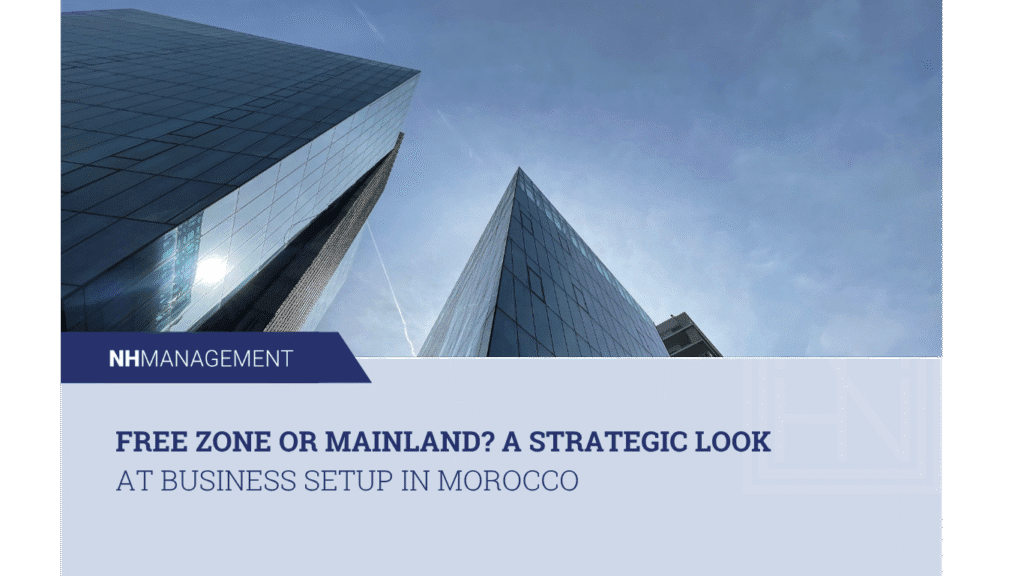Free Zone or Mainland? A Strategic Look at Business Setup in Morocco

Introduction: Making the Right Start in Morocco
One of the most important decisions for foreign investors entering the Moroccan market is choosing where and how to set up: on the mainland or within one of Morocco’s free zones.
Each option offers distinct advantages depending on your business model, tax strategy, and expansion plans. At NH Management, we help investors assess their structure from day one — ensuring regulatory compliance, tax efficiency, and long-term scalability.
Here’s a practical comparison of free zone va mainland setup in Morocco.
What Is a Mainland Company in Morocco?
A mainland company is registered under Moroccan commercial law and can operate freely across Morocco. It is the default form of business incorporation through the Centre Régional d’Investissement (CRI).
Mainland Advantages:
-
Full access to the domestic Moroccan market
-
Ability to sign government contracts and serve local customers
-
Broader real estate options (retail spaces, offices, etc.)
-
Eligible for Morocco’s national investment incentives
Mainland Considerations:
-
Subject to standard corporate tax rates (typically 20%-32%)
-
VAT registration required for most businesses
-
More regulatory layers for certain sectors (e.g., hospitality, education)
What Is a Free Zone Company in Morocco?
Morocco operates several export-focused Free Zones (Zones Franches d’Exportation), the most prominent being:
-
Tangier Free Zone (TFZ)
-
Casablanca Finance City (CFC)
-
Kenitra Free Zone (Atlantic Free Zone)
-
Nador West Med Zone (under development)
Free zones are designed to attract international trade, manufacturing, logistics, and finance. Companies registered in these zones benefit from special tax regimes — but they are primarily intended for export-oriented activities.
Free Zone Advantages:
-
Corporate tax exemption for 5 years, then reduced to 8.75%
-
No VAT, customs duties, or import/export taxes within the zone
-
Dedicated industrial and logistics infrastructure
-
Streamlined setup and customs clearance
-
Ability to repatriate profits freely
Free Zone Limitations:
-
Not allowed to directly trade with the Moroccan local market
-
May require a separate mainland branch to serve local clients
-
Office options are limited to designated zone facilities
-
Some sectors (e.g., F&B retail, consulting) are restricted
Use Case Comparison
| Scenario | Recommended Structure |
| Trading with Moroccan customers | Mainland SARL or SA |
| Exporting goods internationally | Free Zone (TFZ or Kenitra) |
| Setting up a finance or fintech company | Casablanca Finance City (CFC) |
| Logistics or distribution for EU/MENA | Tangier Free Zone |
| Real estate development or tourism | Mainland |
| Remote tech startup with no physical trade | Mainland or Free Zone, depending on tax preferences |
FAQ: What Foreign Clients Often Ask Us – Free Zone vs Mainland in Morocco
Can I own 100% of a Free Zone or Mainland company in Morocco?
Yes, in most sectors, 100% foreign ownership is permitted, whether you choose a Free Zone or Mainland setup.
Can I set up a company in a Free Zone but operate in the local Moroccan market?
Not directly. To legally engage in local commercial activity, your Free Zone company would need to establish a Mainland branch or subsidiary.
Which is faster to set up: Free Zone vs Mainland?
Free Zone companies typically benefit from a more streamlined setup process. However, both Free Zone and Mainlandstructures can be efficiently managed with NH Management’s support.
Free Zone vs Mainland – Which is better for tax purposes?
Free Zones offer attractive tax advantages, particularly for export-oriented or financial services businesses. Mainland companies, while taxed on local profits, may qualify for national incentive programs and grants.
Our Advisory View: Free Zone vs Mainland – Which One Is Best?
There’s no one-size-fits-all answer — the right choice in the Free Zone vs Mainland decision depends entirely on your business objectives:
-
If your goal is to sell products or services directly within Morocco, a Mainland company is the right fit.
-
If your focus is on exports or operating in financial services, consider a Free Zone structure — especially Casablanca Finance City (CFC) or Tangier Free Zone.
At NH Management, we help clients make informed decisions on Free Zone vs Mainland setups. We assess your model and recommend the most efficient structure — whether it’s a single jurisdiction or a dual setup (Mainland + Free Zone) to maximize flexibility and minimize tax exposure.
Ready to Choose the Right Setup – Free Zone vs Mainland?
Book a consultation with NH Management and receive a tailored business structuring roadmap for Morocco — including legal setup, banking, tax optimization, and regulatory compliance. Get in touch!